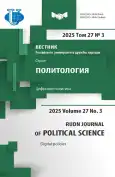Концептуальная модель оптимизации взаимодействия государства и граждан в условиях цифровой трансформации современной России
- Авторы: Морозова С.С.1
-
Учреждения:
- Санкт-Петербургский государственный университет
- Выпуск: Том 27, № 3 (2025): Цифровая политика
- Страницы: 638-653
- Раздел: ЦИФРОВАЯ ТРАНСФОРМАЦИЯ
- URL: https://bakhtiniada.ru/2313-1438/article/view/348841
- DOI: https://doi.org/10.22363/2313-1438-2025-27-3-638-653
- EDN: https://elibrary.ru/JKKOVG
- ID: 348841
Цитировать
Полный текст
Аннотация
Оптимизация взаимодействия государства и граждан в условиях цифровой трансформации России требует комплексного подхода, выходящего за рамки технологических решений. Для системного анализа этой проблемы предложена и теоретически обоснована интегративная пятикомпонентная концептуальная модель, включающая технологическую инфраструктуру, институционально-правовое обеспечение, механизмы гражданского участия, информационную открытость и среду доверия. Апробация модели, основанная на серии экспертных фокус-групп с представителями власти, бизнеса и научного сообщества, выявила существенную асимметрию в развитии ее компонентов. При технологическом прогрессе фиксируются дефицит доверия к цифровым инициативам государства, скептицизм в отношении реального влияния механизмов электронного участия и слабость диалога между властью и обществом. Обоснован вывод, что эффективная оптимизация взаимодействия невозможна без фундаментальных изменений, направленных на построение доверия, обеспечение реального участия граждан, повышение прозрачности и совершенствование институтов. На основе анализа сформулированы практические рекомендации для государственной политики.
Об авторах
Светлана Сергеевна Морозова
Санкт-Петербургский государственный университет
Автор, ответственный за переписку.
Email: s.s.morozova@spbu.ru
ORCID iD: 0000-0002-7069-7208
кандидат политических наук, старший научный сотрудник, доцент кафедры российской политики, факультет политологии
Санкт-Петербург, Российская ФедерацияСписок литературы
- Alimov, E.V., & Pomazanskiy, A.E. (2020). Deliberative democracy: New challenges and opportunities in the information society. Journal of Foreign Legislation and Comparative Law, 83(4), 47–66. https://doi.org/10.12737/jflcl.2020.031 EDN: UWKRAR
- Alonso, S., Keane, J., & Merkel, W., (Eds.). (2011). The future of representative democracy. Cambridge University Press. Retrieved from https://assets.cambridge.org/97811070/03569/frontmatter/9781107003569_frontmatter.pdf
- Barber, B. (1995). Participatory democracy. In Encyclopedia of Democracy (vol. 3, p. 923). Routledge.
- Blumler, J.G., & Coleman, S. (2015). Democracy and the media — Revisited. Javnost — The Public, 22(2), 111–128. https://doi.org/10.1080/13183222.2015.1041226
- Coleman, S. (2018). Can the Internet strengthen democracy?. Aletheia.
- Dahl, R. (2000). On democracy. Aspent Press.
- Dobrinskaya, D.E., & Martynenko, T.S. (2019). Prospects for the Russian information society: Levels of the digital divide. RUDN Journal of Sociology, 19(1), 108–120. https://doi.org/10.22363/2313-2272-2019-19-1-108-120 EDN: VUHAGN
- Dunleavy, P., & Margetts, H. (2025). Data science, artificial intelligence and the third wave of digital era governance. Public Policy and Administration, 40(2), 185–214. https://doi.org/10.1177/09520767231198737
- Habermas, J. (2001). The inclusion of the other: Studies in political theory. Nauka.
- Malodia, S., Dhir, A., Mishra, M., & Bhatti, Z. (2021). Future of e-Government: An integrated conceptual framework. Technological Forecasting and Social Change, 173, 121102. https://doi.org/10.1016/j.techfore.2021.121102
- Mircică, N. (2020). Restoring public trust in digital platform operations: Machine learning algorithmic structuring of social media content. Review of Contemporary Philosophy, 19, 85–91. https://doi.org/10.22381/RCP1920209
- Morozova, S. (2024). Formation of a dynamic model for optimizing e-government in the Russian Federation under new challenges and risks. Political Expertise: POLITEX, 19(3), 415–430. https://doi.org/10.21638/spbu23.2023.304 EDN: HTLNOC
- Morozova, S.S. (2025). Digital dialogue: The role of social media and digital platforms in communication between the state and the citizen. Creative Economy, 19(1), 9–30. https://doi.org/10.18334/ce.19.1.122329 EDN: VJBIQK
- Nosonov, A.M. (2015). The theory of diffusion of innovations and the innovative development of Russian regions. Pskov Journal of Regional Studies, 23, 3–16. EDN: UWPERL
- Parkinson, J., & Mansbridge, J. (Eds.). (2012). Deliberative systems: Deliberative democracy at the large scale. Cambridge University Press. Retrieved from https://voidnetwork.gr/wp-content/uploads/2016/09/Deliberative-Systems-by-John-Parkinson-and-Jane-J-Mansbridge.-.pdf
- Pateman, C. (2012). Participatory democracy revisited. Perspectives on Politics, 10(1), 7–19.
- Rogers, E., Singhal, A., & Quinlan, M. (2019). Diffusion of innovations. In An integrated approach to communication theory and research (3rd ed., pp. 415–433). Routledge. https://doi.org/10.4324/9780203710753-35
- Sassen, S. (2002). Towards a sociology of information technology. Current Sociology, 50(3), 365–388. https://doi.org/10.1177/0011392102050003005
- Shchekotin, E.V. (2020). Digital technologies in the social sciences: The subject and method of digital sociology. Sociology and Law, 1(47), 49–59. https://doi.org/10.35854/2219-6242-2020-1-49-59 EDN: EVEDKP
- Smorgunov, L.V. (2019). Participatory public governability: Platforms and cooperation. Power, 27(5), 9–19. https://doi.org/10.31171/vlast.v27i5.6712 EDN: ULUOEO
- Van Dijk, J. (2012). The evolution of the digital divide: The digital divide turns to inequality of skills and usage. In Digital enlightenment yearbook 2012 (pp. 57–75). IOS Press. https://doi.org/10.3233/978-1-61499-057-4-57
- Volodenkov, S.V. (2016). Evolution of traditional institutions of representative democracy in the post-information society: Problems and prospects. Electoral Legislation and Practice, 3, 47–51. EDN: YPMUPP
Дополнительные файлы









